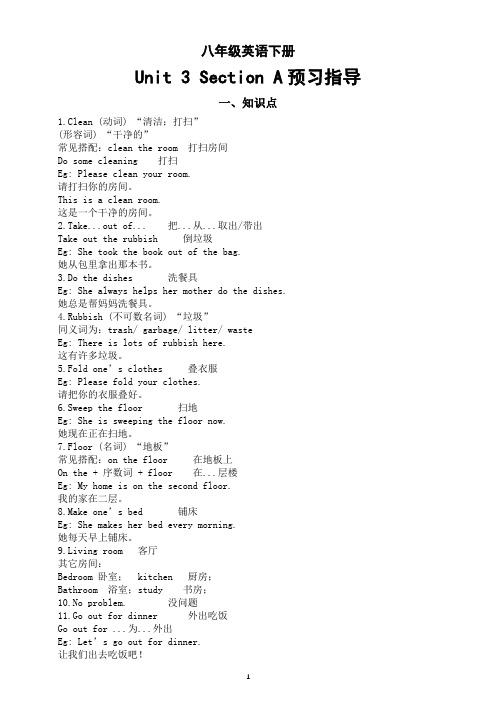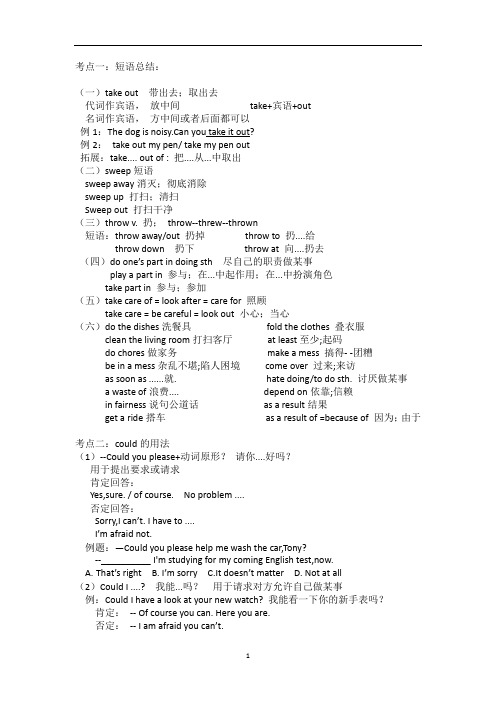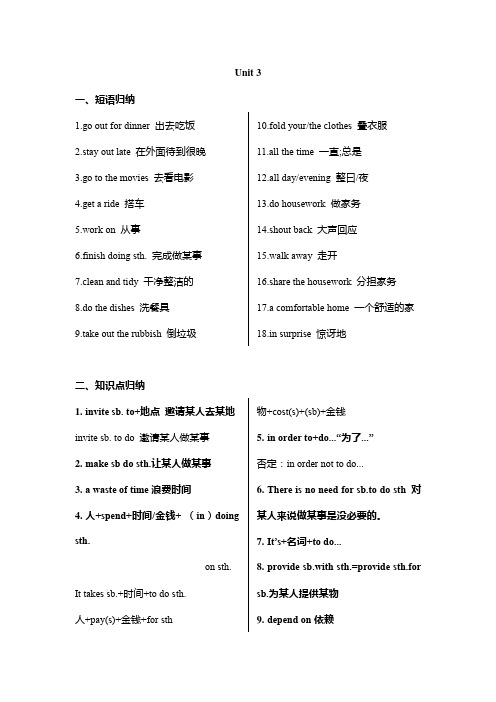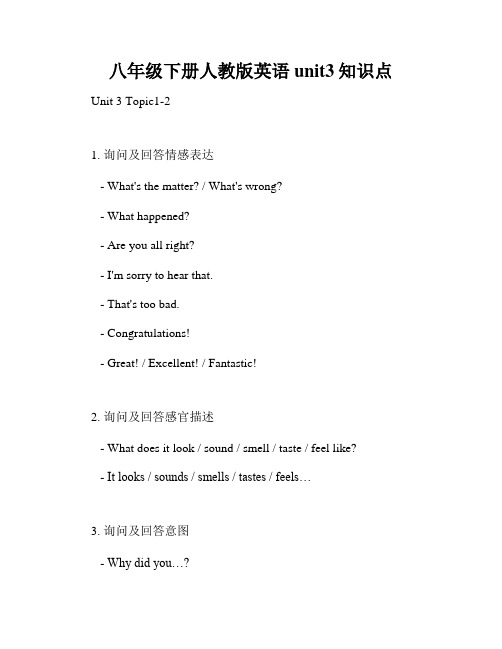八下unit3知识点
(完整版)八年级英语下册Unit3知识点总结Couldyoupleasecleanyourroom

Unit3 Could you please clean your room?Peter ,could you please take out the trash?彼得,你能把垃圾倒了吗?Could you please do sth ?请你(做)......好吗?用于提出恳求,希望获得对方的必定回答,说话的语气比较客气委宛。
Could不是can的过去式,是委宛、礼貌的说法。
回答用can.【常用答语】必定回答:Sure./ Of course./ Certainly./No problem.否认回答:Sorry , I can’t2、 take out取出(v+ adv)【注】 : 跟代词做宾语,代词放中间;跟名词做宾语,可放在中间,也可放在后边His teeth hurt badly. The dentist take them out .【短语】 take out the trash倒垃圾take a walk take back回收take place发生take off 3. Can you do the dishes.?那你能够洗盘子吗?do the dishes洗碗漫步脱下;take away腾飞拿走,取走【构造 1 】 do the + 名词:do the dishes/ laundry洗餐具/衣服【构造 2 】 do the + 动词 -ing do the cleaning打扫卫生【构造 3 】 do one ’ s +名词do one ’ s housework/ homework做家务/家庭作业【构造 4 】 do some + 动词 -ing do some reading/ shopping读写书/购物Could I at least finish watching this show?起码让我看完这个节目能够吗?1】 Could I do a sth?我能够做......吗?用于表达恳求,语气比较委宛。
Unit3 知识点人教版英语八年级下册

Unit 3Section A1.Peter,could you please take out the rubbish?(1) Could you please+动词原形?其否定形式是"Could you please+not+动词原形…?”。
肯定回答常用“Yes,sure./Sure. Certainly./Of course./ No problem/ With pleasure.”否定回答常用"I'm sorry, I can’t./Sorry, I can’t. /I’m afraid I can’t /I’m sorry, but...例Could you please hand out these books?Yes,sure./Sorry,I can’t. I have to sweep the floor.例题Could you please help me carry the heavy bag?A. It's a pleasureB. With pleasureC. You're welcomeD. It doesn’t matter(2)take out 带出去,取出,拔出,除掉动副短语Please take out a piece of paper. =Please take a piece of paper out.Please take it out.[拓展]take... out of...意为“把…从…取出/带出”。
Please take the books out of your schoolbag.(3) rubbish用作不可数名词,意为“垃圾;废弃物。
2 sweep the floor扫地(1) sweep( swept swept)此处用作及物动词,意为“扫;打扫”。
(2)floor用作可数名词,意为“地板”,通常指室内地面on the fl oor“在地板上”。
八年级(下)英语Unit3知识点,重点短语及句型

Unit3 What were you doing when the UFO arrived知识点:1.过去进行时表示在过去某一时刻或某个时间段内正在进行的动作,由“主语+was/were+动词的现在分词”构成。
2.arrive,reach与get(1)arrive是不及物动词,后跟名词时需用arrive in或arrive at。
(2)reach是及物动词,直接跟地点名词作宾语。
(3)get是不及物动词可以不跟宾语,需接宾语时用。
注意:arrive和get后接副词时,须省略介词at,in,to。
3.in front of与in the front of(1)in front of在…….的前面,指在这一事物的前面。
其反义词为behind,意为“在……后面”。
(2)in the front of在…….(范围内)的前面,指在这一事物内部的前面。
其反义词组为at the back of ,意为“在……(范围内)的后部”。
4.one…..the other, the other, others,the other(1.)one….the other指两者中的“一个,另一个”。
(2.)the others指“其余的”,表示在一个范围内的其他全部。
(3.)others与some对比使用,意为“有些”而不是“其他”。
(4.)the other是指其中的另一个5.happen to do sth. 碰巧做某事。
happen to sb. 某人发生了什么事。
6.everyday与every day(1)everyday是一个形容词,意为“每天的,日常的”只作定语,即用来修饰名词。
(2)every day则用作状语,意为“每天”。
7.shout at, shout to(1)shout at意为“向……喊\叫嚷\训斥”。
后接表示人的名词或代词,shout at有时表示训斥某人,含有恶意。
(2)shout to意为“向…..喊叫”,表示向某人大声喊叫以便让某人听见,不含恶意。
初中英语人教新目标八年级下册Unit 3 SectionA预习指导(知识点+练习题)

八年级英语下册Unit 3 Section A预习指导一、知识点1.Clean (动词) “清洁;打扫”(形容词) “干净的”常见搭配:clean the room 打扫房间Do some cleaning 打扫Eg: Please clean your room.请打扫你的房间。
This is a clean room.这是一个干净的房间。
2.Take...out of... 把...从...取出/带出Take out the rubbish 倒垃圾Eg: She took the book out of the bag.她从包里拿出那本书。
3.Do the dishes 洗餐具Eg: She always helps her mother do the dishes.她总是帮妈妈洗餐具。
4.Rubbish (不可数名词) “垃圾”同义词为:trash/ garbage/ litter/ wasteEg: There is lots of rubbish here.这有许多垃圾。
5.Fold one’s clothes 叠衣服Eg: Please fold your clothes.请把你的衣服叠好。
6.Sweep the floor 扫地Eg: She is sweeping the floor now.她现在正在扫地。
7.Floor (名词) “地板”常见搭配:on the floor 在地板上On the + 序数词 + floor 在...层楼Eg: My home is on the second floor.我的家在二层。
8.Make one’s bed 铺床Eg: She makes her bed every morning.她每天早上铺床。
9.Living room 客厅其它房间:Bedroom 卧室; kitchen 厨房;Bathroom 浴室;study 书房;10.No problem. 没问题11.Go out for dinner 外出吃饭Go out for ...为...外出Eg: Let’s go out for dinner.让我们出去吃饭吧!12.Go to the movies 去看电影类似词组:see the film 看电影Eg: They went to the movies last night.他们昨晚去看电影了。
八年级英语unit3知识点总结

八年级英语unit3知识点总结八年级英语Unit 3知识点总结Unit 3是八年级英语的重要单元,包括了现在进行时态、时间的表达方式和一些常见的动词短语等。
本文将就此进行总结,以供各位同学参考。
一、现在进行时态现在进行时态是指现在正在进行的动作或状态,它的构成是“be +现在分词”,be的形式根据主语在人称和数上变化。
例如:I am reading a book.Tom is playing basketball.They are listening to music.注意,在构成现在进行时态时,动词的变化是在现在分词上进行的。
动词的变化规则如下:1. -e结尾动词,去掉e加ing(例外:be去掉e后加ing)。
2. 重读闭音节词结尾,双写最后一个字母再加ing。
3. 以辅音字母+y结尾的动词,变y为i再加ing。
例如:love – lovingrun – runningget – getting二、时间的表达方式英语中有很多表达时间的方式,下面介绍一些常见的用法:1. at表示“在…时刻”,常用于表示某一具体的时刻。
例如:at six o’clock(在6点钟)at the weekend(在周末)2. in表示“在…期间”,常用于表示某一段时间和月份等。
例如:in the morning(在早晨)in the summer(在夏季)in May(在五月)3. on表示“在具体某一天”,和具体某一天相关的表示时间的形容词或名词后必须用on。
例如:on Monday(在周一)on the 12th(在12号)on New Year’s Day(在元旦)三、常见的动词短语1. go on表示“发生”,可以用于句子的主语为事情而非人的情况下。
例如:What’s going on here?(这里发生了什么事情?)2. take a break表示“休息”,常用于日常生活中。
例如:Let’s take a break.(我们休息一下吧。
人教版八年级英语下册Unit3短语归纳+重点考点总结

考点一:短语总结:(一)take out 带出去;取出去代词作宾语,放中间take+宾语+out名词作宾语,方中间或者后面都可以例1:The dog is noisy.Can you take it out?例2:take out my pen/ take my pen out拓展:take.... out of : 把....从...中取出(二)sweep短语sweep away消灭;彻底消除sweep up 打扫;清扫Sweep out 打扫干净(三)throw v. 扔;throw--threw--thrown短语:throw away/out 扔掉throw to 扔....给throw down 扔下throw at 向....扔去(四)do one’s part in doing sth 尽自己的职责做某事play a part in 参与;在...中起作用;在...中扮演角色take part in 参与;参加(五)take care of = look after = care for 照顾take care = be careful = look out 小心;当心(六)do the dishes洗餐具fold the clothes 叠衣服clean the living room打扫客厅at least至少;起码do chores做家务make a mess 搞得--团糟be in a mess杂乱不堪;陷人困境come over 过来;来访as soon as ......就. hate doing/to do sth. 讨厌做某事a waste of浪费.... depend on依靠;信赖in fairness说句公道话as a result结果get a ride搭车as a result of =because of 因为;由于考点二:could的用法(1)--Could you please+动词原形?请你....好吗?用于提出要求或请求肯定回答:Yes,sure. / of course. No problem ....否定回答:Sorry,I can’t. I have to ....I’m afraid not.例题:—Could you please help me wash the car,Tony?--__________ I'm studying for my coming English test,now.A.That’s rightB. I’m sorryC.It doesn’t matterD. Not at all(2)Could I ....? 我能...吗?用于请求对方允许自己做某事例:Could I have a look at your new watch? 我能看一下你的新手表吗?肯定:-- Of course you can. Here you are.否定:-- I am afraid you can’t.(3)表示能力Could表示过去的能力,can表示现在的能力can--couldCould you speak English then?那时候你会说英文吗?例题:1.-- ______you give me a hand? I can’t move the box by myself.-- No problem.A.CouldB. ShouldC.MustD. Need2.Li Ming_______speak two languages when he was eight years old.A.mayB. canC. can'tD. could考点三:1.复数名词(短语)作主语用法表示时间、重量、距离、价格等的复数名词(短语)作主语,谓语动词一般用单数形式ten minutes/ four thousand dollars ..做主语例题:For kids of this age, two hours of sitting in a classroom______too long.A.isB.areC. wasD.were考点四:For one week,she didn’t do any housework and neither didi I.(1)neither/nor +be动词/助动词/情态动词+主语结构“也不....’’ 注意:Me neither. 不能说Me nor.(2)作代词,"两者都不"neither of 结构作主语时,谓语动词用单数Neither of them has a car. 他们两个都没有汽车。
英语八年级下册unit3知识点

英语八年级下册unit3知识点英语八年级下册Unit3主要是涉及到旅游及热门景点相关内容。
在这一单元中,我们学习了许多关于出行的单词和词组,同时也学习了旅游方面的文化知识。
下面,本文将围绕这些知识点,总结归纳出本单元的核心知识点。
第一部分:旅游方面的单词和词组1. sightseeing:观光2. destination:目的地3. travel,journey:旅行4. tour:游览5. accommodation:住宿6. transportation:交通7. ticket:票8. guide:导游9. excursion:短途旅游我们应该注意这些单词的正确发音和用法,使自己的英语更加准确清晰。
第二部分:旅游方面的文化知识1. 美食文化:在旅游中品尝当地的美食也是很重要的一部分。
比如在中国,烤鸭和火锅就是很受外国人欢迎的美食。
在日本,则是寿司和生鱼片。
2. 交通文化:在不同国家,交通方式也是各不相同的。
比如在欧洲,大多数人选择步行或骑行,而在中国城市,公共交通比较发达,人们通常乘坐地铁、公交车等。
3. 饮食礼仪:在不同国家,饮食礼仪也是有所不同的。
比如在中国,用餐时要招待客人,避免用筷子顶餐盘等等礼仪问题。
在日本,则更注重吃饭时的细节和仪式感。
第三部分:热门景点在这个单元中我们还学习了关于热门景点的话题。
下面介绍一些世界著名热门景点。
1. 埃菲尔铁塔:法国巴黎的标志性建筑。
2. 自由女神像:位于美国纽约港口,是法国人向美国人赠送的礼物。
3. 金门大桥:连接美国旧金山和马林县,是世界上最著名的桥梁之一。
4. 罗马斗兽场:意大利罗马的古代竞技场,是世界历史上最著名的文化遗产之一。
5. 万里长城:中国的镇国之宝,是目前世界上保存最完好、规模最宏大的古代筑墙工程。
总结:英语八年级下册Unit3,主要涉及旅游方面的单词和词组、旅游方面的文化知识和世界著名热门景点。
我们可以通过学习这些知识点,提高我们的英语交流能力,也可以更好地了解和欣赏不同国家的风土人情。
八年级下册人教版U3知识点

八年级下册人教版U3知识点
本篇文章将为大家介绍八年级下册人教版U3知识点,主要包
括三个方面:地球的形状、地球的运动和地球的地理划分。
一、地球的形状
地球是一个略带扁球的球体,其极半径比赤道半径略小。
这种
形状被称为地球的地球形状,是由各种内外因素共同作用形成的。
目前,人们已经通过卫星观测、地球观测卫星、高空探险等多种
手段验证了地球的地球形状。
二、地球的运动
地球的运动主要包括自转和公转两种。
自转是地球以西偏北的北极轴为中心沿其自身的轴心进行的旋转。
自转的周期是23小时56分4秒,它引起了地球上昼夜交替、四季更替、风云变幻等现象。
公转是地球沿着一个椭圆形的轨道围绕太阳运行。
地球的公转周期为365.24日,决定了地球四季变化的规律。
三、地球的地理划分
地球的地理划分主要包括纬度和经度。
纬度指的是从赤道到地球两极的线条,按照经纬度来分,地球共被划分为90个纬度带,0度为赤道。
经度指的是垂直于赤道的线条,分别向东西方向延伸。
经度以一度为单位,沿着赤道划分,从0度开始,东经为正数,西经为负数,一圈共360度。
除此之外,地球还被划分为七大洲和五大洋,在人类的生活和探索中占据了重要地位。
总之,八年级下册人教版U3知识点涉及到地球形状、地球运动和地球的地理划分三方面,这些知识点是理解地球奥秘和探索地球资源的基础。
八年级英语(下)unit3知识点归纳

Unit 3 Modern machines1. hardly 副词. “几乎不,简直不”表示否定意义。
eg. I can hardly believe it. 我简直不能相信这件事。
He hardly ate anything these days. 他这些天几乎没吃什么东西。
拓展:表示否定意义的词:not, nor, never, rarely, scarcely等。
2. be unaware of 没有意识到……; 没有察觉到……be aware of 意识到……; 察觉到……unaware 形容词,“意识到,知道的”反义词:aware 形容词,“明白,了解,意识到”awareness 名词,意为“认识, 觉察, 意识”eg. We are all unaware of the environmental protection. 我们都没有意识到要保护环境。
We must raise our environmental awareness. 我们必须提高环保意识。
3. dependent形容词,“依靠的,依赖的”反义词:independent 独立的,自主的搭配:be dependent on 依赖,依靠拓展:dependence 名词“依赖。
依靠”eg. He is dependent on his parents and doesn’t want to grow up. 他依靠着父母生活,不想长大。
We should be independent when we become adults. 长大后我们应该独立生活。
4. operate1)作及物动词,“操作,运转”。
eg. His job is to operate this machine. 他的工作就是开这部机器。
2)作不及物动词,“运转”eg. The lift wasn’t operating properly. 这部电梯运转不正常。
Unit3 单元知识点总结课件--八年级英语下册(人教版)

A.return back
B.return
C.give
4. —— Last week I ____________ a CD ____________ my neighbor.
—— You shouldn’t ____________ it ____________ Xiao Wang.
A. borrowed; from; lend; to B. lent; from; borrow; to
2.5 drop
v. 落下;掉下;降低 (drop- dropped-dropped- dropping)
The glass dropped and broken. Be careful not to drop the glass. drop by 顺便拜访
n. drop 滴,水珠 A drop of water 一滴水
—— ________. I’m going to do my homework.
A. Sorry, I can’t
B. No, I couldn’t
C. Yes, you can
D. Never
3. Would you please _______ the children ______ on the street?
(in)dependent adj. (不)独立的
China is a dependent country.
2.2 provide
provide
✓ provide sb. with sth. ✓ provide sth. for sb.
提供某人某物
I provided some food for him. I provided him with some food.
Unit 3知识点精析(下)+课文注释人教版英语八年级下册

人教版丨初中英语八年级下册Unit 3知识点精析(下)+课文注释1.invite my friends to a party邀请我的朋友们来参加聚会要点精析invite为及物动词,意为“邀请”。
invite sb.to do sth.意为“邀请某人做某事”。
例:We invited all our friends.我们邀请了我们所有的朋友。
Kate invited me to go to the movies with her.凯特邀请我和她一起去看电影。
知识拓展invite 的名词形式为invitation,意为“邀请;请帖”。
例:Thank you for your kind invitation.谢谢你的盛情邀请。
2. I do not understand why some parents make their kids help with housework and chores at home.我不理解为什么一些父母让他们的孩子在家帮忙做家务。
要点精析make their kids help with housework and chores 是 make sb. do sth.结构,此结构意为“让/使某人做某事”。
例:This good news made her laugh happily.这个好消息使她开心地笑了。
3.Housework is a waste of their time.(做)家务是浪费他们的时间。
要点精析a waste of...意为“浪费……”,其中waste是名词,意为“浪费;滥用”。
例:Playing computer games is a waste of time.玩电脑游戏是浪费时间的。
知识拓展waste还可作动词,意为“浪费”。
例:Don't waste your money on clothes.别把你的钱浪费在衣服上。
4. They should spend their time on schoolwork in order to get good grades and get into a good university.为了取得好成绩,进入一所好大学,他们应该把他们的时间花在学业上。
Unit 3 短语知识点归纳练习 人教版英语八年级下册

Unit 3 一、短语归纳1.go out for dinner 出去吃饭2.stay out late 在外面待到很晚3.go to the movies 去看电影4.get a ride 搭车5.work on 从事6.finish doing sth. 完成做某事7.clean and tidy 干净整洁的8.do the dishes 洗餐具9.take out the rubbish 倒垃圾10.fold your/the clothes 叠衣服11.all the time 一直;总是12.all day/evening 整曰/夜13.do housework 做家务14.shout back 大声回应15.walk away 走开16.share the housework 分担家务17.a comfortable home 一个舒适的家18.in surprise 惊讶地二、知识点归纳1.invite sb. to+地点邀请某人去某地invite sb. to do 邀请某人做某事2.make sb do sth.让某人做某事3.a waste of time浪费时间4.人+spend+时间/金钱+ (in)doing sth.on sth. It takes sb.+时间+to do sth.人+pay(s)+金钱+for sth 物+cost(s)+(sb)+金钱5.in order to+do...“为了...”否定:in order not to do...6.There is no need for sb.to do sth 对某人来说做某事是没必要的。
7.It’s+名词+to do...8.provide sb.with sth.=provide sth.for sb.为某人提供某物9.depend on依赖10.be always doing总是做某事,常表达说话人的某种情绪,如赞扬、不满、责备等11.develop v.发展development n.发展12.do one’s part in doing 在...尽职责13.as a result结果14.fall ill生病fall asleep入睡15.take care of照顾=look after=care for16.The+比较级...the+比较级... 越...越...17.fair adj.公平的(反)unfair adj.不公平的fairness n.公正性、合理性练习一、单项选择1.Could you please ________the rubbish here?A.don't put B.not to put C.not putD.to not put 2.23. It is necessary for us students the listening ability.A.to improve B.improving C.improveD.improves 3.My father often listens to the radio he is driving.A.until B.because C.while D.where 4.Jack can't play the piano. _______.A.So can I B.So I can C.Neither can I D.Neither I can 5.—Would you mind my sitting here?—_______.A.Never mind B.No, of course notC.Yes, I would D.I'm sorry to hear that6. It’s nice of you to______ so much time showing me around your school.A. takeB. spendC. costD. have7. All of us find _______ necessary to take exercise every day .A. thisB. thatC. themD. it8. The new kind of car is ______ dear, I don’t have ______money.A. too much: much tooB. much too: too muchC. too much: too muchD. much too: much too9. — There is some rubbish here. Please ______.A. take it outB. take out itC. take them outD. take out them10. — Excuse me , Peter. There is something wrong with my car. Could I ______ ?— Yes, sure.A. go for a driveB. go for a walkC. have a driveD. get a ride二、阅读Do teenagers in small villages do chores at home? How about the teenagers in big cities? Here is a survey. We asked 4,000 teenagers in China several questions. Half of them come from big cities like Beijing, Shanghai and Guangzhou. The others are from small villages. We made a diagram of the result of our survey. Let’s have a look at it. We found out that teenagers from small villages do more chores than those from big cities. Maybe it is because they live a harder life. Our advice to parents in big cities is that parents should give their children some chores to do. Doing chores teaches teenagers to take care of themselves.1.They surveyed ______ teenagers from small villages.A.1,000B.2,000C.3,000D.4,000 2.There are 1,000 teenagers from the cities who ______.A.take out the trashB.do the dishesC.make the bedD.fold the clothes3.Fewer than ______ teenagers in big cities sweep the floor and make the bed. A.500B.1,000C.1,500D.2,0004.The number of teenagers ______ in big cities is bigger than that in small villages. A.making the bedB.taking out the trashC.folding the clothesD.doing the dishes5.Why did they make the survey?A.Because they don’t want teenagers in China to do chores at home. B.Because they thought it will help teenagers to take good care of themselves to dochores.C.Because they wanted to know if teenagers in China do chores at home. D.Because they thought it is not necessary for teenagers to look after themselves.三、用所给词的适当形式填空1. The teacher often tells us not _____________ (not surf) the Internet.2. Come on! I have something important to _____________ (tell) you.3. I haven’t decided when to _____________ (take) a holiday yet.4. To _____________ (be) healthy, we should eat more vegetables and fruits.5. My job is to _____________ (study) hard.6.It’s not enough for students to just get good ________ (grade) at school. 7.I’m trying to sleep. Would you mind ________ (turn) down the music? 8.The fourth day of July is the National ________ (independent) Day of the US. 9.Doing chores can help children understand the idea of ________ (fair). 10.Our country is ________ (develop) very quickly now.四、根据汉语意思完成句子1.为了通过考试,他每天都努力学习。
八年级下册unit3知识点总结

—I’d like to trekthroughthe jungle, because I like exciting vacations.我想徒步穿越丛林,因为我喜欢令人兴奋的假期。
课文原句:For your next vacation,why notconsidervisiting Paris?你的下一个假期为什么不考虑去游览巴黎呢?
例题(1)—Waiter! I’d like some beef and a vegetable salad.
—Sorry Madam. They ___C____ only for lunch. Why not consider _______ something else?
consider sb as....把某人看作...
be considered as...被看作...
consider it+形容词+to do sth认为做某事是...的
例句赏析:Wu Zetian,the only woman emperor to rule ancient China,is considered as one of the most powerful women in Chinese history.武则天是唯一一位统治中国古代的女皇帝,被认为是中国历史上最有权势的女性之一。
例题(2)I__B______ the room. I hope you can keep it as clean as it is now.
A.cleanB.have cleanedC.was cleanedD.will clean
初二八年级英语Unit3知识点

八下Unit3知识梳理Section A1.Could you please do sth ?请你(做)......好吗?用于提出请求,希望得到对方的肯定回答,说话的语气比较客气委婉。
Could 不是can的过去式,是委婉、礼貌的说法。
回答用can.【常用答语】肯定回答:Sure./ Of course./ Certainly./No problem.否定回答: Sorry , I can’t例句: Could I go out with my classmate this weekend? sure you can!2. at least 至少,多指数量或程度上的最低限度。
(反) at most 至少,不超过3.finish v 结束;完成 finish doing sth 做完某事例句:I have finished reading the book4. two hours of TV表示时间、距离、金额、度量等词语作主语时,通常被视作整体,谓语动词用单数形式。
How time is flies! Three years _______(be) really a short time.5..enough修饰名词时,置于名词前;修饰形容词时,置于形容词之后。
I don’t have enough money with me. The river is deep enough for swimming.Mr. Smith has enough money ,but he isn’t kind enough to help others.6.take out 带出【拓展】take 构成的短语:take a walk 去散步 take a rest 休息 take care of 照顾 take off 脱下;起飞take up 占据 take down 拿下 take one’s time 不急;慢慢来 take one’s temperature 量体温7. the minute = as soon as “一...... 就......” Please write to me the minute you get there.8。
八年级下册人教版英语unit3知识点

八年级下册人教版英语unit3知识点Unit 3 Topic1-21. 询问及回答情感表达- What's the matter? / What's wrong?- What happened?- Are you all right?- I'm sorry to hear that.- That's too bad.- Congratulations!- Great! / Excellent! / Fantastic!2. 询问及回答感官描述- What does it look / sound / smell / taste / feel like?- It looks / sounds / smells / tastes / feels…3. 询问及回答意图- Why did you…?- What are you going to …?- What do you intend to…?- I intend to… / I plan to…4. 问路及指路,口语表达中熟悉的方向词汇- Excuse me, could you tell me the way to…?- How can I get to…?- The nearest bus stop / subway station / bank / post office is… - It's on the left / right / opposite…Unit 3 Topic 3-41. 表达偏好及兴趣- Would you like…?- What kind of…do you like?- Do you prefer…to…?- I'm into…- I'm fond of…- I enjoy…2. 指出和辨认物品及人物(描述外貌和服装)- What does he / she look like?- He / She has…(描述头发颜色、眼睛、身材特征、穿戴等)3. 询问及描述活动安排- What are you going to do…?- What will you do…?- I'll…4. 描述天气- What's the weather like today?- It's sunny / cloudy / rainy / snowy / windy…- It's hot / warm / cool / cold…Unit 3 Topic 5-61. 表示和理解时间和星期- What time is it?- What's the date today?- What day is it today?- How many days are there in a week?- What do you usually do on weekends?2. 描述行程及活动- Tomorrow, I'm going to…(描述行程)- On Monday / Tuesday / Wednesday…, I usually… - In the morning / afternoon / evening / at night…, I…3. 询问及回答感受- How do you feel?- I feel…(描述感受)4. 描述位置- Where is the…? It's…(描述方位)以上是八年级下册人教版英语unit3的知识点总结,有效巩固这些知识点,可以让你在英语学习中更加得心应手。
人教版八年级下册Unit3 知识点详解与练习

Unit 3一、词形扩展1.sweep v.扫;打扫→(过去式&过去分词)2.throw v. 扔;掷→(过去式)→(过去分词)3.lend v.借给;借出(过去式&过去分词)4.hate v.厌恶→(过去式&过去分词)5.stress n.精神压力;心理负担→adj.有压力的;焦虑不安的6. waste v.& n. 浪费;滥用→(过去式&过去分词)7. provide v.提供;供应→(过去式&过去分词)8. develop v.发展;壮大→adj.发达的→adj.发展中的→ n.发展;发育;成长9. depend v.依靠;信赖→ n. 依靠;依赖→adj.依靠的;依赖的→adj.独立的;自主的→ n. 独立10. fair adj.合理的;公正的→n.公正性;合理性→adj.不合理的;不公正的11. drop v.落下;掉下→(过去式&过去分词)12. ill adj.有病;不舒服→ n.疾病13.neighbor n. 邻居→ n.街区;街坊二、短语归纳1. have no idea how to take care of himself 不知道怎样照料自己2. grades dropped 成绩下降3. something to drink 喝的东西4. finish doing sth. 完成做某事5. mind (not) doing sth. 介意(不) 做某事6. welcome sb. 欢迎某人7. invite sb. to sp. 邀请某人去某处8. be angry with sb. 对某人生气9. make sb. do sth. 使某人做某事10. It’s adj. (for sb.) to do sth. 对于某人来说,做某事时…11. there is no need for somebody to do something 对于某人来说没必要做…12. provide sth. for sb. / provide sb. with sth. 为某人提供某物三、知识点汇总1.imagine v想象,设想2.open.close,closed的用法和区别3.carry, bring,take与get的区别和用法4.双重所有格5.feel + adj to do : 做某事感觉怎么样6.kind, kindly, kindness的区别7.以ness结尾的单词一般是名词8.Could you please do.....? 你能.......吗?9.Could I do...? 我能.......吗?10.表示时间、距离、度量、重量、金额等的复数名词作主语,被看作整体时,谓语动词用单数;11.welcome的用法:12.the minute: 一.....就......(=as soon as)13.“我也是,我也不”的表达详解版1.imagine v想象,设想imagine to do:想着去做某事。
unit3八年级下册知识点

unit3八年级下册知识点在八年级下册学习中,Unit 3 是相当重要的一单元。
学习这一单元,需要了解许多知识点。
在本文中,我将为大家介绍 Unit 3中的主要知识点。
一、数字表示法在数学中,数字表示法是十分常见的。
它指的是数字如何写成一定位数的算式。
常见的数字表示法有整数、小数、分数和百分数等。
其中,小数包括循环小数和无限小数两类。
在进行计算时,我们需要根据实际情况选择最合适的数字表示法。
二、加减法加减法是数学中最基本的运算之一。
它包括了两个运算:加法和减法。
加法是指将两个或两个以上的数加在一起,得到它们的和;而减法则是指用一个数减去另一个数,得到它们的差。
在进行加减法计算时,我们需要考虑相加或相减的数的位数、进位和借位等。
三、乘除法乘除法是数学中较为复杂的运算。
乘法是指将两个数相乘,得到它们的积;而除法则是指将一个数除以另一个数,得到商和余数。
在进行乘除法计算时,我们需要根据实际情况选择最合适的算法,以便快速而准确地得到答案。
四、算式的转化在数学学习中,我们需要经常将算式进行转化。
转化可以帮助我们更好地理解和分析数学问题。
常见的算式转化有合并同类项、分解因式、配方法和分形式等。
在转化算式时,我们需要遵循一定的规律和方法,以便准确有序地进行计算。
五、方程和不等式方程和不等式是数学中较为高级的概念。
方程指的是一个等式,其中包含了一个或多个未知数。
不等式则是一个包含不等号的数学表达式,其中至少有一个数是未知数。
在解方程和不等式问题时,我们需要逐步推导和分析,以找到未知数的值。
总之,以上就是 Unit 3 八年级下册数学的主要知识点。
在学习这一单元时,我们需要认真了解和掌握这些知识点,并通过练习来提高自己的计算能力和分析能力。
希望大家能够在学习中取得更好的进步!。
八年级下册Unit 3知识点

八年级下册Unit 3知识点【单元目标】2.目标句型:1. What were you doing when...?2. I was doing sth. when...3. How about... / What about...?4. What happened next?5. While sth./sb. was doing sth., I did...3.语法1.过去进行时2.情态动词的用法Ⅱ【重难点分析】一.过去进行时过去进行时表示过去某一时刻或者某段时间正在进行或发生的动作,常和表过去的时间状语连用,如:I was doing my homework at this time yesterday.昨天的这个时候我正在做作业。
They were waiting for you yesterday.他们昨天一直在等你。
过去进行时的构成:肯定形式:主语+was/were+V-ing否定形式:主语+was not (wasn“t)/were not (weren“t)+V-ing疑问形式:Was/Were+主语+V-ing。
基本用法:1.过去进行时表示过去某一段时间或某一时刻正在进行的动作。
常与之连用的时间状语有,at that time/moment, (at) this time yesterday(last night/Sunday/week…), at+点钟+yesterday (last night / Sunday…),when sb. did sth 等时间状语从句,如:Whatwereyoudoingat7p.m.yesterday?昨天晚上七点你在干什么?I first met Mary three years ago. She was working at a radio shop atthe time.我第一次遇到玛丽是在三年前,当时她在一家无线电商店工作。
I was cooking when she knocked at the door.她敲门时我正在做饭。
人教版八年级下册英语Unit 3单元语法知识点总结

人教版八年级下册英语Unit 3单元语法知识点总结本单元重点短语的具体用法1. do the dishes:洗餐具- I need to do the dishes before going out.(我出门前需要洗餐具。
)2. take out the rubbish:倒垃圾- Can you take out the rubbish, please?(你能倒一下垃圾吗?)3. fold your clothes:叠衣服- Remember to fold your clothes neatly.(记得把你的衣服叠整齐。
)4. sweep the floor:扫地- She sweeps the floor every day.(她每天都扫地。
)5. make your bed:整理床铺- It's your turn to make your bed.(轮到你整理床铺了。
)6. clean the living room:打扫客厅- We need to clean the living room before guests arrive.(在客人到来之前,我们需要打扫客厅。
)7. go out for dinner:出去吃饭- Let's go out for dinner tonight.(我们今晚出去吃饭吧。
)8. go to the movies:去看电影- They like to go to the movies on weekends.(他们喜欢在周末去看电影。
)9. stay out late:在外面待到很晚- Don't stay out late, it's not safe.(别在外面待太晚,不安全。
)10. get a ride:搭车- I'll get a ride with my friend.(我会和我朋友一起搭车。
)11. work on doing sth:从事做某事- He is working on writing a novel.(他正在写一本小说。
- 1、下载文档前请自行甄别文档内容的完整性,平台不提供额外的编辑、内容补充、找答案等附加服务。
- 2、"仅部分预览"的文档,不可在线预览部分如存在完整性等问题,可反馈申请退款(可完整预览的文档不适用该条件!)。
- 3、如文档侵犯您的权益,请联系客服反馈,我们会尽快为您处理(人工客服工作时间:9:00-18:30)。
Unit3 Could you please clean your room?知识点讲一讲1(section A)1.peter, could you please take out the rubbish? 彼得,请你去倒一下垃圾好吗?2. could you please sweep the floor? 请你把地扫一下好吗?(1)Could +主语+please +动词原形+……?(=Could +主语+动词原形+……,please?)表示委婉地提出请求,意为“请……,好吗?”肯定回答:yes , sure / of course / certainly.否定回答:sorry, I can’t , I have to ……如:Could you please help me with my English ? =Could you help me with my English, please?请你帮助我学英语好吗?(2)take out :意为“带出去;取出”。
如:Take out the rubbish 把垃圾带出去即倒垃圾。
Please take out a piece of paper . 请把这张纸带出去。
Take …out :把……带出去。
如:my father is taking me out to go for a drive. 我的父亲将带我出去开车。
[拓展] 与take有关的短句take off脱掉;(飞机)起飞take place 发生take part in 参加take care of 照顾take after 与…相像it take sb sometimes to do sth 做某事花费某人一些时间。
如:it took me two hours to do my homework. 做家务花费我两个小时的时间。
(3)sweep the floor :意为“扫地”与“家务劳动”有关的短语:Take out the rubbish / trash 倒垃圾fold one’s clothes 叠衣服Clean the room 打扫房间make one’s the bed 铺床Do the dishes 洗餐具do the laundry 洗衣服Clean the floor 擦地板cook dinner 做饭3.you have to clean your room. 你不得不打扫你的房间。
(1)have to 表示“不得不”,而must 侧重于个人的主观意志。
如:did she have to pay a fine ? 她不得不交罚款吗?I must go there to help the poor. 我必须去那儿帮助那些穷人们。
4. I threw down my bag and went to the living room . 我扔下我的包,去客厅了。
(1)throw 意为“扔;掷”,过去式为threw;throw down 意为“扔下”。
如:I threw down the money and went out . 我扔下钱走了。
5. could I use your computer ? 我能用你的电脑吗?Sorry, I’m going to work on it now. 对不起,我现在打算用它工作。
(1)work on : 从事;忙于;在(用)……工作。
如:he has worked on his company for ten years. 他在他的公司工作十年了。
My brother works on writing 我的哥哥从事写作。
练一练11. — Could you please clean the room?— _____ I have to do my homework.A. Yes, sure.B. Why not?C. Sorry, you can’t.D. Sorry, I can’t.2. — Could I please ______?—Sorry, you can’t. Your mother has to use it.A. do choresB. go to the moviesC. use the carD. go to school3.— Mum, Could I go to Beijing with you?—Yes, ________. But you have to finish your homework first.A. you canB. you couldC. yo u can’tD. you couldn’t4. —Would you like to come to my birthday party?—I’d love to, ___________I’m too busy.A. andB. ifC. soD. but5.---Could I borrow your dictionary?---Yes, of course, you____.A. mightB. willC. canD. should6. we the trash that you leave.A. take offB. take outC. take afterD. take place7. ---It’s hot today, isn’t it ?--- yes, it is , why not your jacket?A. take careB. take placeC. take afterD. take off8. It me an hour to learn English today.A. takeB. take careC. take offD. take place9.If your clothes are dirty ,you need to ______________.A. do the dishesB. fold your clothes B. do the laundry D. sweep the floor10. After the washed clothes are dry, you need to _______________A. make your the bedB. fold your clothes B. do the laundry D. sweep the floor11. I go to school by bus because my home is far from the school.A. mustB. have toC. had toD. has to12. I be there on time.A. have toB. mustC. needD. musn’t13. 放学后我扔下书包就出去玩。
After school I the bag and went out to play.14. 在学校我忙于读书没有时间打乒乓球。
At school I reading did not have time to play table tennis.15. he has the education for thirty years.A. worked onB. worked inC. worked upD. worked after讲一讲21.表示“请求”的句型还有:(1)would you mind doing……?你介意……吗?同意回答:No, not at all 没问题(不介意)不同意回答:yes, I do mind 是的,我介意如:Would you mind cleaning your room ? 你介意打扫你的房间吗?Would you mind my closing the windows? 你介意我关上窗户吗/?(2)Would you like to do sth? 你想做某事吗?如:would you like to come to my party? 你想参加我的聚会吗?Would you like to go boating ? 你想去划船吗?(3)can / may / could / might + 主语+动词原形……?……可以吗?如:can I go home now?我现在能去你家吗?May we ask you some questions ? 我们可以问一些问题吗?Could you tell me where the post office is ? 你能告诉我邮局在哪儿吗?2. Tony, Could you please help out with a few things ? 托尼,你能帮助处理几件事吗?(1)help out with 给予帮助。
如:My mom always asking me to help out with my little sister我的妈妈总是要求我帮助我的小妹妹。
3.you watch TV all the time and never help out around the house. 你总是看电视从来不帮助做家务。
(1)all the time=always 意为“一直;总是”。
[拓展] 与time 有关的短句at times 有时from time to time 有时;偶尔at the same time 同时in time 及时on time 按时at once= right now 立刻;马上如:we must be here on time 我们必须按时到这儿。
(2)any minute now 随时马上如:The guests are arriving any minute now but we are still not ready.客人马上就到但我们还没准备。
4. Could you please pass me the salt? 你能把盐递给我吗?(1)pass后可以接双宾语:pass sb sth=pass sth to sb 意为“把某物递给某人”如:the waiter passed me the food. = the waiter passed the food to me 服务员把食物递给了我。
(2)pass 意为“通过”。
如:you’ll have to work hard if you want to pass exam. 如果你想通过考试就得用功。
5. Could I at least finish watching this show? 我至少可以看完这个节目吗?I finished reading it last night. 我昨天晚上读完了。
